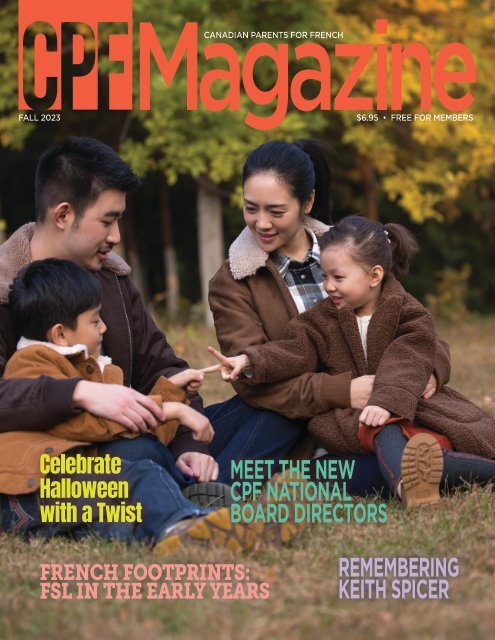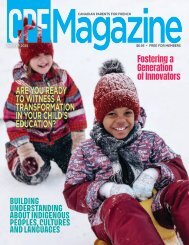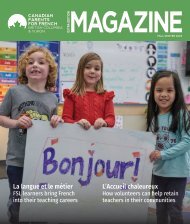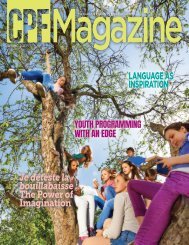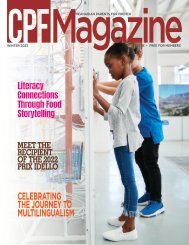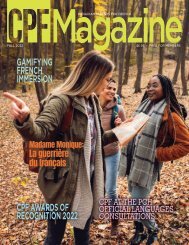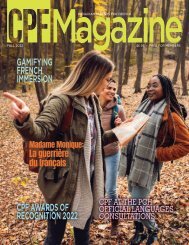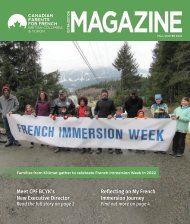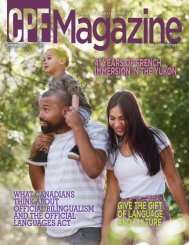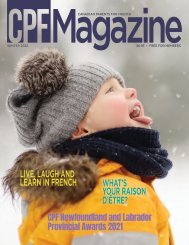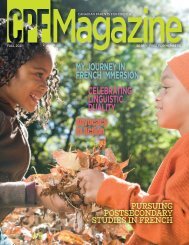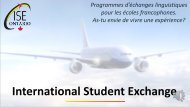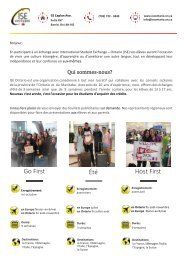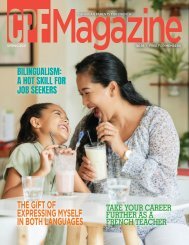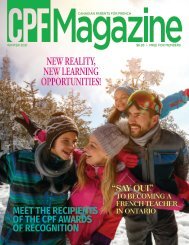CPF Magazine Fall 2023
A national network of volunteers, parents and stakeholders who value French as an integral part of Canada. CPF Magazine is dedicated to the promotion and creation of French-second-language learning opportunities for young Canadians.
A national network of volunteers, parents and stakeholders who value French as an integral part of Canada. CPF Magazine is dedicated to the promotion and creation of French-second-language learning opportunities for young Canadians.
- No tags were found...
Create successful ePaper yourself
Turn your PDF publications into a flip-book with our unique Google optimized e-Paper software.
CANADIAN PARENTS FOR FRENCH<br />
FALL <strong>2023</strong><br />
$6.95 • FREE FOR MEMBERS<br />
Celebrate<br />
Halloween<br />
with a Twist<br />
MEET THE NEW<br />
<strong>CPF</strong> NATIONAL<br />
BOARD DIRECTORS<br />
FRENCH FOOTPRINTS:<br />
FSL IN THE EARLY YEARS<br />
REMEMBERING<br />
KEITH SPICER
<strong>Magazine</strong><br />
CANADIAN PARENTS FOR FRENCH<br />
FALL <strong>2023</strong><br />
www.cpf.ca<br />
CONTRIBUTORS<br />
Najah Dhuny, Dominique Labas,<br />
Marcos Salaiza and other authors and<br />
organizations as noted in their articles.<br />
EDITORIAL MANAGER<br />
Marcos Salaiza<br />
GRAPHIC DESIGN<br />
Stripe Graphics Ltd.<br />
PRINTING<br />
Trico Packaging and Print Solutions<br />
SUBMISSIONS<br />
Canadian Parents for French<br />
1104 - 170 Laurier Ave. W.<br />
Ottawa, ON K1P 5V5<br />
(613) 235-1481, www.cpf.ca<br />
Advertising: Cathy Stone<br />
Canadian Parents for French<br />
Email: advertise@cpf.ca<br />
<strong>CPF</strong> <strong>Magazine</strong> is published three times per<br />
year for members of Canadian Parents for<br />
French. Our readership includes parents<br />
of students learning French as a second<br />
language, French language teachers,<br />
school board or district staff, and provincial,<br />
territorial and federal government staff<br />
responsible for official languages education.<br />
CHANGE OF ADDRESS<br />
To signal a change of address,<br />
contact Canadian Parents for French<br />
at (613) 235-1481, or email:<br />
cpf.magazine@cpf.ca<br />
Editorial material contained in this<br />
publication may not be reproduced<br />
without permission.<br />
Publications Mail Agreement No. 40063218<br />
Return undeliverable mail to Canadian<br />
Parents for French at the address above.<br />
To become an online subscriber, email<br />
cpf.magazine@cpf.ca. For an online version<br />
of this issue, visit www.cpf.ca.<br />
FALL <strong>2023</strong><br />
Table of Contents<br />
FEATURES<br />
2 Bienvenue dans l’équipe !<br />
3 Remembering Keith Spicer, Canada’s First<br />
Commissioner of Official Languages<br />
8 Meet the New Members of the<br />
<strong>CPF</strong> National Board of Directors<br />
10 Infographic: Official Languages in Canada<br />
14 Celebrate Halloween with a Twist!<br />
REGULAR ARTICLES<br />
2 PRESIDENT’S MESSAGE<br />
6 <strong>CPF</strong> PARTNERS<br />
French-language Postsecondary Studies...<br />
Is It the Right Option For My Child?<br />
12 <strong>CPF</strong> PROJECTS<br />
French Footprints: FSL In the Early Years<br />
16 <strong>CPF</strong> PARTNERS<br />
Are You Expecting the Unexpected?<br />
18 <strong>CPF</strong> BRANCHES<br />
Embracing Culture and Unity:<br />
Volunteers from Canadian Parents<br />
for French at NAIG <strong>2023</strong><br />
20 KEY <strong>CPF</strong> CONTACTS ACROSS CANADA<br />
21 <strong>CPF</strong> YOUTH ACTIVITY<br />
Canadian Parents for French is a nationwide, research-informed, volunteer organization<br />
that promotes and creates opportunities to learn and use French for all those who<br />
call Canada home.
PRESIDENT’S MESSAGE<br />
As the leaves change colour and the<br />
temperatures drop, at the <strong>CPF</strong> Network<br />
we are gearing up for an exciting fall! We<br />
hope the new school year is going smoothly<br />
for parents and students alike. With this fall<br />
issue of <strong>CPF</strong> <strong>Magazine</strong> we want to contribute<br />
to everyone’s success this year. You will find<br />
insightful articles with resources and ideas to<br />
support your students, as well as the latest<br />
updates on <strong>CPF</strong> projects.<br />
At the end of the summer, we learned<br />
of the passing of Keith Spicer, Canada’s first<br />
Commissioner of Official Languages whose vision<br />
made possible the establishment of our organization.<br />
<strong>CPF</strong> National communicated with his family to share sympathies<br />
on behalf of the <strong>CPF</strong> Network. We remember him in this issue<br />
with an article on page 3.<br />
On September 14, the <strong>CPF</strong> community celebrated Canada's<br />
Official Languages Day. Youth Activity kits were distributed to<br />
educational leaders that included the colourful poster found on<br />
the inside cover of this publication.<br />
This fall <strong>CPF</strong> is launching a new project<br />
in partnership with Families Canada and<br />
123 Petit pas called French Footprints: FSL<br />
in the Early Years, a pilot project focused on<br />
introducing FSL programs in early childhood<br />
learning. Learn all about this project on page<br />
12. Elsewhere in this issue you will find Branch<br />
updates and news from our partners.<br />
Throughout the fall, several virtual and<br />
in-person events are happening from cultural<br />
events to fun game nights. Be sure to stay<br />
connected to your Branch and to the <strong>CPF</strong><br />
Network via social media to not miss anything.<br />
We value your commitment and support as Members. We wish<br />
you a productive fall and please know that the <strong>CPF</strong> Network is<br />
here to help with your FSL journey. À la prochaine! n<br />
DERREK BENTLEY<br />
<strong>CPF</strong> NATIONAL PRESIDENT<br />
Bienvenue dans<br />
l’équipe !<br />
Join us in welcoming<br />
Joel Martine, the<br />
newly hired Interim<br />
Executive Director for<br />
Canadian Parents for<br />
French Manitoba.<br />
Joel has a background<br />
in strategic planning,<br />
financial management,<br />
and youth development.<br />
As the former Director<br />
of Youth Integration at<br />
the Economic Development Council for Bilingual<br />
Municipalities of Manitoba (CDEM), Joel showcased<br />
an impressive ability to drive transformative<br />
initiatives and foster strategic partnerships.<br />
With his entrepreneurial spirit and passion for<br />
empowering the next generation, Joel is poised to<br />
lead <strong>CPF</strong> Manitoba with success and contribute<br />
greatly to the <strong>CPF</strong> Network! n<br />
Université d’Ottawa | University of Ottawa<br />
FRENCH IMMERSION<br />
at uOttawa<br />
The next step in<br />
bilingual education!<br />
• French immersion available in 75 undergraduate programs<br />
• All FSL students are eligible<br />
• Special courses to make the transition to bilingual<br />
university studies<br />
• An extra $1,000 per year for studying bilingually<br />
• An authentic bilingual environment in Canada’s capital<br />
immersion@uOttawa.ca<br />
www.immersion.uOttawa.ca<br />
2 <strong>CPF</strong> MAGAZINE FALL <strong>2023</strong>
Remembering<br />
Keith Spicer<br />
Canada’s First Commissioner<br />
of Official Languages<br />
continued...<br />
<strong>CPF</strong> MAGAZINE FALL <strong>2023</strong> 3
<strong>CPF</strong> is mourning the loss of Keith Spicer, a most<br />
important official languages champion, the first<br />
Commissioner of Official Languages and the man<br />
whose vision brought forward the establishment<br />
of our grassroots, volunteer organization in 1977.<br />
It is thanks to Mr. Spicer that Canadian Parents<br />
for French came to be. To respond to the demand<br />
of parents interested in French language learning<br />
opportunities for their children, Mr. Spicer offered to<br />
find seed money to organize a national conference of<br />
like-minded parents. The result was an event called<br />
“Parents’ Conference on French Language and Exchange<br />
Opportunities,” which took place in Ottawa in March<br />
of 1977.<br />
It was during this weekend-long conference that<br />
Canadian Parents for French was officially founded<br />
as a volunteer-based advocacy group, a collective of<br />
parents who wanted to ensure that children would have<br />
the opportunity to become bilingual in the Canadian<br />
school system.<br />
As seen in our <strong>CPF</strong> How it All Started video<br />
(available on the <strong>CPF</strong> National YouTube channel), the<br />
parents who worked directly with him in the seventies<br />
share fond memories of how he empowered them to<br />
share their voices and how he supported their desire for<br />
every Canadian child to have the opportunity to learn<br />
In 1977, Keith Spicer was serving as<br />
Canada’s first-ever Commissioner<br />
of Official Languages. Interested in<br />
the bilingualism of Canada’s youth,<br />
he met with groups of parents<br />
across Canada who wanted their<br />
children to learn French as a<br />
second language (FSL) but who<br />
ran into roadblocks at the local<br />
school boards.<br />
4 <strong>CPF</strong> MAGAZINE FALL <strong>2023</strong>
Mr. Spicer’s legacy will live on in the bilingual students<br />
and citizens living in communities across Canada.<br />
French, regardless of where they lived in the country. He had<br />
such a strong vision and he was tenacious in moving projects forward.<br />
He was known for his knowledge, dedication and passion,<br />
and strived to see a Canada where all of its residents support<br />
and appreciate official bilingualism.<br />
Mr. Spicer continued to support <strong>CPF</strong>, checking in every so often<br />
to ask about our challenges and priorities. In 2020, he agreed<br />
to conduct interviews to expand our historical archives and he<br />
joined our virtual conference delegates who were most delighted<br />
to have the opportunity to chat with this official language icon<br />
who changed and improved the course of education in Canada.<br />
<strong>CPF</strong> National office released a formal statement<br />
and has communicated with his family on behalf of the <strong>CPF</strong><br />
Network to share our most sincere condolences. n<br />
<strong>CPF</strong> MAGAZINE FALL <strong>2023</strong> 5
<strong>CPF</strong> PARTNERS<br />
French-language<br />
postsecondary studies...<br />
Is it the right option for my child?<br />
As parents, you have surely guided<br />
and supported your children through<br />
various stages in their lives. While<br />
it is important to constantly provide the<br />
best advice to children, the fact is that<br />
particular stages are more important than<br />
others, and some interventions more<br />
critical. Choosing the language in which to<br />
pursue postsecondary studies in Canada is<br />
precisely one of these pivotal stages in a<br />
young person’s life.<br />
It is no secret that bilingualism<br />
enhances one’s professional opportunities.<br />
Yet, you may still question whether the<br />
skills acquired in high school are sufficient<br />
for your child to pursue postsecondary<br />
studies in the language of Molière.<br />
To this question, Bethany March<br />
brings the most forthright answer: “To<br />
anyone tinkering with the idea of pursuing<br />
French after high school, just go for it! It<br />
is not easy, but it is rewarding. I thought I<br />
knew everything about French coming out<br />
of high school, but I was quickly humbled<br />
in my first year! Over four years, I learned<br />
more about the language than I ever<br />
could have imagined in grade 12.” Jasmine<br />
Ferreira also shares Bethany’s vision. She<br />
states: “It is normal to feel hesitant when<br />
facing change. The decision to pursue your<br />
studies in a second language takes courage<br />
and requires adaptability, but sometimes<br />
you must step out of your comfort zone to<br />
achieve success.”<br />
The good news is that if your child<br />
opts for this “daring” alternative, a<br />
bursary is there to offer support and<br />
motivation. Indeed, since 2019, the<br />
Government of Canada mandated the<br />
Association des collèges et universités de<br />
la francophonie canadienne (ACUFC) to<br />
administer a program that grants bursaries<br />
for postsecondary studies in French as a<br />
second language. The program aims to<br />
encourage young English-speaking high<br />
school graduates to pursue postsecondary<br />
education in French. This non-renewable<br />
bursary, worth $3,000, can be awarded<br />
when your child decides to take at<br />
least 50% of courses and associated<br />
activities in French, within one of several<br />
postsecondary entities participating in the<br />
program.<br />
Since 2019, this bursary has assisted<br />
hundreds of students in reducing the<br />
financial cost of their postsecondary<br />
studies. In that respect, here is what Chris<br />
Dick mentions: “The bursary significantly<br />
reduced the financial burden of tuition,<br />
which allowed me to spend more time on<br />
my studies rather than working, and acted<br />
as additional incentive to participate in the<br />
bilingual program.”<br />
6 <strong>CPF</strong> MAGAZINE FALL <strong>2023</strong>
<strong>CPF</strong> PARTNERS<br />
Along with financial benefits that<br />
incite students from English-speaking<br />
high schools to persist on their pathway to<br />
bilingualism, the FSL bursary also intends<br />
to recognize the longtime commitment<br />
made by parents and children, and<br />
acknowledge their mutual efforts. In our<br />
opinion, Mahleia Fabian found the most<br />
appropriate words to capture this notion:<br />
“This bursary is a celebration of all the<br />
years I could have left the French language<br />
behind, but I didn’t.”<br />
As Mahleia highlighted so well,<br />
becoming bilingual has most certainly<br />
required a lot of efforts from your children.<br />
Choosing to pursue their postsecondary<br />
studies in French would be an excellent<br />
means of preserving what they took years<br />
to build. In that spirit, Sophia Andia states:<br />
“I had been studying in Immersion for most<br />
of elementary school and all of high school,<br />
and I didn’t want to lose the skill after<br />
working so hard to develop it.” To which<br />
Francesco Balassone adds: “Knowing more<br />
languages and expanding one's cultural<br />
vision is always an asset, and I would<br />
have hated to let all those years<br />
of schooling and culture go to waste.”<br />
Moreover, all of the recipients of the<br />
FSL bursary are well aware of the fact that<br />
the decision to pursue their postsecondary<br />
studies in French is a winning gamble,<br />
which will open new horizons for them<br />
in the future. In this respect, Chris Dick<br />
mentions: “I would encourage you to<br />
remember that French postsecondary<br />
studies are a privilege from which you<br />
can derive great benefit, both personally<br />
and professionally. French postsecondary<br />
studies are an investment in yourself, and<br />
any extra upfront work can pay dividends<br />
in the future and lead to opportunities<br />
currently unforeseen.” Similarly, Sophia<br />
Andia says: “Especially in Canada, being<br />
able to speak French is a great asset that<br />
will allow you to get a leg up over your<br />
competition when searching for jobs.”<br />
In addition to expanding their<br />
professional opportunities, recipients of<br />
the FSL bursary agree on the value of their<br />
experiences during their postsecondary<br />
studies in Francophone contexts, both<br />
individually and socially. In this regard,<br />
Natasha Rebecca Babcock talks about her<br />
experience as follows: “The bursary also<br />
encouraged me to have faith in myself<br />
and my abilities. I have been elected as<br />
Vice President of Bilingual Affairs for<br />
the UO Global Brigades team for two<br />
years in a row, and I am now working<br />
at the University of Ottawa in a very<br />
bilingual position.” And Ryley Nathaniel<br />
adds: “I really appreciate how being in<br />
a French-speaking context allows me to<br />
communicate with people that I would<br />
be isolated from if I were unilingual.”<br />
Ultimately, there are several benefits<br />
to pursuing postsecondary studies in<br />
French, along with the bonus of the FSL<br />
bursary administered by the ACUFC!<br />
For more information on the FSL bursaries<br />
and eligibility criteria, please visit the<br />
following link: ACUFC.ca/boursesFLS n<br />
<strong>CPF</strong> MAGAZINE FALL <strong>2023</strong> 7
Meet the New Members of the<br />
<strong>CPF</strong> National Board of Directors<br />
Volunteer and Staff Leaders during the <strong>CPF</strong> Leaders Networking Event <strong>2023</strong> in Gatineau, QC.<br />
Derrek Bentley<br />
PRESIDENT<br />
Dr. Kate Ashley<br />
VICE PRESIDENT<br />
Salma Al-Saquaf<br />
TREASURER<br />
Diane Tijman<br />
DIRECTOR AT LARGE<br />
Isabelle LeVert-Chiasson<br />
DIRECTOR AT LARGE<br />
8 <strong>CPF</strong> MAGAZINE FALL <strong>2023</strong>
The <strong>CPF</strong> National AGM kicked off the annual <strong>CPF</strong> Leaders’ Networking<br />
Event program with topics related to Network governance and<br />
strategic planning.<br />
During the 47th Annual General Meeting held on July 7 in Gatineau,<br />
Québec, the Canadian Parents for French (<strong>CPF</strong>) Network ratified the<br />
election of three Directors (one incumbent and two newly elected)<br />
to the <strong>CPF</strong> National Board of Directors, as well as the reelection of Derrek<br />
Bentley (Winnipeg, MB) as <strong>CPF</strong> National President and the election of<br />
Dr. Kate Ashley (Kentville, NS) as <strong>CPF</strong> National Vice-President.<br />
The incumbent director, Diane Tijman (Richmond, BC) returns for<br />
a third term. The Board also named returning director Salma Al-Saquaf<br />
(Calgary, AB) as Treasurer of the <strong>CPF</strong> National Board. Two new directors<br />
joined the <strong>CPF</strong> National Board for a two-year term:<br />
n Isabelle LeVert-Chiasson (Ottawa, ON) Ms. LeVert-Chiasson is<br />
a proud Acadian. She is the Education Program Officer for the<br />
Canadian Commission of UNESCO. She also has extensive experience<br />
collaborating and building relationships with Indigenous organizations<br />
in Canada and with school, university and community associations.<br />
As a parent of two, she is passionate about the French language and<br />
education opportunities.<br />
n Kate Ashley (Kentville, NS) As former president of <strong>CPF</strong> NS Branch,<br />
Dr. Ashley brings a wealth of <strong>CPF</strong> and French related experience<br />
and service. She currently is the Assistant Dean of Arts and Assistant<br />
Professor at Acadia University (NS). Dr. Ashley will serve as National<br />
Vice-President for <strong>2023</strong>-2024.<br />
This year’s theme was Reimagining<br />
<strong>CPF</strong> 2.0, with important discussions<br />
about Diversity, Equity, Inclusion and<br />
The <strong>CPF</strong> National AGM kicked off the annual <strong>CPF</strong> Leaders’ Networking<br />
Event program with topics related to Network governance and strategic<br />
planning. This year’s theme was Reimagining <strong>CPF</strong> 2.0, with important<br />
discussions about Diversity, Equity, Inclusion and Decolonization; Official<br />
and Indigenous Languages Education in Canada.<br />
“We are looking forward to continuing efforts in achieving our vision<br />
of a strong, equitable and resilient Network focused on building shared<br />
leadership to support the delivery of the <strong>CPF</strong> Network’s mandate. I would<br />
like to welcome our new and returning Board Directors. We are all very<br />
excited to see the realization of the reimagined <strong>CPF</strong> 2.0. I am confident that<br />
our diligent Network volunteers and staff leaders will continue to contribute<br />
to these important and common goals for the whole organization, and<br />
how we may optimize Network collaborations in the year ahead,” added<br />
Mr. Bentley, <strong>CPF</strong> National President.<br />
Sincere thanks were extended to Dr. Wendy Carr (BC), Kate Peters<br />
(AB) and Larry Vaters (NL) who completed their respective terms on the<br />
<strong>CPF</strong> National Board. n<br />
Decolonization; Official and Indigenous<br />
Languages Education in Canada.<br />
<strong>CPF</strong> MAGAZINE FALL <strong>2023</strong> 9
TOTAL POPULATION 1<br />
Official Languages in<br />
CANADA<br />
People who can speak English: 31.8M (87% of population)<br />
People who can speak French: 10.7M (29% of population)<br />
YUKON<br />
NUNAVUT<br />
Newfoundland and Labrador 504,805<br />
Prince Edward Island 152,455<br />
Nova Scotia 958,990<br />
New Brunswick 764,630<br />
Quebec 8,406,905<br />
Ontario 14,099,790<br />
Manitoba 1,326,815<br />
Saskatchewan 1,116,045<br />
Alberta 4,221,835<br />
British Columbia 4,951,660<br />
Yukon 39,840<br />
Northwest Territories 40,545<br />
Nunavut 36,645<br />
Canada 36,620,955<br />
33,950<br />
85<br />
5,660<br />
BRITISH COLUMBIA<br />
4,461,290<br />
1,785<br />
326,865<br />
NORTHWEST<br />
TERRITORIES<br />
35,940<br />
100<br />
4,295<br />
ALBERTA<br />
3,894,690<br />
3,105<br />
258,330<br />
33,105<br />
65<br />
1,390<br />
MANITOBA<br />
1,197,535<br />
1,680<br />
110,435<br />
NEWFOUNDLAND<br />
AND LABRADOR<br />
QUÉBEC<br />
445,575<br />
3,980,275<br />
3,898,980<br />
477,900<br />
130<br />
25,945<br />
PRINCE EDWARD<br />
ISLAND<br />
131,465<br />
135<br />
19,385<br />
SASKATCHEWAN<br />
1,055,000<br />
450<br />
51,970<br />
People who can speak English, but not French<br />
People who can speak French, but not English<br />
ONTARIO<br />
12,196,575<br />
39,310<br />
1,519,365<br />
NEW BRUNSWICK<br />
442,430<br />
60,175<br />
260,120<br />
NOVA SCOTIA<br />
856,200<br />
605<br />
98,940<br />
People who can speak English and French<br />
ENGLISH IN THE CANADIAN POPULATION<br />
FRENCH IN THE CANADIAN POPULATION<br />
25,261,655<br />
people can speak English, but not French<br />
(69% of population)<br />
4,087,895<br />
people can speak French, but not English<br />
(11.2% of population)<br />
27,881,228<br />
people speak English as their first official<br />
language (76.1% of population)<br />
8,066,633<br />
people speak French as their first<br />
official language (22% of population)<br />
28,948,790<br />
people have English as a mother tongue, or<br />
speak it at home, or use it at work or have<br />
it as a language of instruction at school<br />
(79.7% of population)²<br />
9,405,325<br />
people have French as a mother tongue, or<br />
speak it at home, or use it awt work or have<br />
it as a language of instruction at school<br />
(25.9% of population)³<br />
31,843,335<br />
people can speak English<br />
(86.9% of population), including<br />
6,581,680 who can speak both<br />
English and French (18% of population)<br />
10,669,575<br />
people can speak French<br />
(29.1% of population), including<br />
6,581,680 who can speak both<br />
French and English (18% of population)
TOTAL POPULATION BY FIRST OFFICIAL LANGUAGE SPOKEN<br />
Canada<br />
36,620,955 (100%)<br />
Quebec<br />
8,406,905 (100%)<br />
Canada outside<br />
of Quebec<br />
28,214,050 (100%)<br />
English<br />
76.1%<br />
(27,881,228)<br />
English<br />
14.9%<br />
(1,253,578)<br />
English<br />
94.4%<br />
(26,627,650)<br />
French<br />
22.0%<br />
(8,066,633)<br />
French<br />
84.1%<br />
(7,074,328)<br />
French<br />
3.5%<br />
(992,305)<br />
HISTORY<br />
From time immemorial, Indigenous peoples have been present<br />
in the land that we now call Canada. Their languages, the first<br />
spoken in this territory, number more than 70 today.<br />
1400s and 1500s: With the arrival of European fishers, traders<br />
and explorers, English, French and other European<br />
languages are spoken on the east coast of the territory.<br />
1599–1608: A lasting French presence is established in what will<br />
become Canada, notably in Tadoussac (1599), Acadia (1605) and<br />
Québec City (1608).<br />
1610–1670: A lasting English presence is established in what<br />
will become Canada, notably in Newfoundland (1610) and Hudson<br />
Bay (1670).<br />
1763: At the end of the Seven Years’ War, New France is ceded<br />
to Great Britain.<br />
1774: The Quebec Act recognizes the Catholic faith and the<br />
French Civil Code in the colony.<br />
1791: The Constitutional Act authorizes an elected assembly in<br />
Upper Canada (Ontario) and Lower Canada (Quebec), and English<br />
and French are recognized as the languages of the legislature of<br />
Lower Canada.<br />
1848-1849: The English and French languages are affirmed in<br />
the legislature of the Province of Canada (Quebec and Ontario)<br />
and in the council of Assiniboia (Manitoba).<br />
1867: The British North America Act is passed. It recognizes<br />
English and French as the languages of Parliament and the<br />
courts of the new federation of Canada.<br />
End of the 19th century: The residential school system, which<br />
aimed to assimilate Indigenous peoples by eliminating their languages<br />
and cultures, expands across Canada. These institutions,<br />
operated primarily in English, though also in French, have a<br />
devastating effect on Indigenous languages across the country.<br />
Beginning of the 20th century: An increasing number of<br />
immigrants who speak other languages come to Canada.<br />
1920s and 1930s: Modest measures are adopted in recognition of<br />
federal bilingualism, including bilingual stamps and currency.<br />
1969: Following the Royal Commission on Bilingualism and<br />
Biculturalism, the Canadian government passes the Official<br />
Languages Act, which recognizes English and French as the official<br />
languages of Canada, affirms their equality in Parliament and the<br />
federal courts, gives public servants the right to work in the official<br />
language of their choice and creates the position of Commissioner<br />
of Official Languages, among other things. New Brunswick passes<br />
a similar Act.<br />
1982: The Canadian Constitution is repatriated, with a charter of<br />
rights and freedoms that constitutionally recognizes English and<br />
French as the official languages of Canada and affirms education<br />
language rights for English speakers and French speakers across<br />
the country. The new constitution also affirms Indigenous rights<br />
and multiculturalism.<br />
1988: The federal Official Languages Act is modernized.<br />
1990s: Following the Supreme Court’s decision in the Mahe v Alberta<br />
case, official language minorities across the country are guaranteed<br />
control over their schools.<br />
2003: The first action plan for official languages introduces the<br />
Government of Canada’s five-year strategy on official languages.<br />
2019: The Indigenous Languages Act is passed. Its aim is to maintain,<br />
revitalize and promote Indigenous languages, including by creating<br />
the position of Commissioner of Indigenous Languages. The new<br />
Act also affirms that the rights of Indigenous peoples set out in the<br />
1982 Constitution include rights related to their languages.<br />
<strong>2023</strong>: The federal government again modernizes the Official<br />
Languages Act.<br />
Sources and notes:<br />
Unless indicated otherwise, all data is from Statistics Canada, Census Profile, 2021 Census of Population, Statistics Canada Catalogue no. 98-316-X2021001, Ottawa.<br />
1<br />
Population based on knowledge of Canada’s official languages<br />
² Data provided by Statistics Canada, from 2021 Census of Population (2A-L). Includes all individuals having English alone or in combination with another language as a mother tongue, or a<br />
language spoken at home, or a language used at work or, among school-aged children who could speak English, reside outside Quebec and had never attended a regular French-language<br />
school or reside in Quebec and had attended a regular English-language school.<br />
³ Data provided by Statistics Canada, from 2021 Census of Population (2A-L). Includes all individuals having French alone or in combination with another language as a mother tongue, or a<br />
language spoken at home, or a language used at work or, among school-aged children who could speak French, reside outside Quebec and had attended a regular French-language school<br />
or a French immersion program or reside in Quebec and had never attended a regular English-language school.<br />
For additional information, please see our Snapshots of official languages in Canada (2021).<br />
OFFICIALLANGUAGES.GC.CA
<strong>CPF</strong> PROJECTS<br />
FSL IN<br />
THE<br />
EARLY<br />
YEARS<br />
Attention<br />
Early Years<br />
Practitioners:<br />
New Pilot<br />
Project!<br />
BY DOMINIQUE LABAS, NATIONAL PROJECTS MANAGER, CANADIAN PARENTS FOR FRENCH<br />
12 <strong>CPF</strong> MAGAZINE FALL <strong>2023</strong>
<strong>CPF</strong> PROJECTS<br />
In partnership with Families Canada and<br />
123 Petits Pas, Canadian Parents for<br />
French is excited to announce “French<br />
Footprints: FSL in the Early Years” - an<br />
innovative pilot project developed to<br />
encourage the introduction of French as<br />
a Second Language (FSL) programming in<br />
early childhood learning!<br />
Purpose<br />
Early learning is a significant time for<br />
language acquisition. The early learning<br />
and care sector is regularly reviewing<br />
pedagogical approaches and practices to<br />
achieve the best possible outcomes for<br />
children during these critical years.<br />
Bilingualism, and FSL learning<br />
opportunities, are proven by research<br />
to provide developmental benefits to<br />
children both short-term and long-term.<br />
As awareness increases around the<br />
benefits of FSL learning (cognitive, cultural,<br />
economic, social and employment), there<br />
continues to be rapidly growing enrollment<br />
in FSL programs. In an ongoing effort to<br />
promote <strong>CPF</strong> initiatives and advocate for<br />
bilingualism across Canada, it is imperative<br />
that we extend our <strong>CPF</strong> reach and support<br />
early childhood education settings by<br />
targeting early bilingualism.<br />
This pilot project underscores the<br />
importance of connecting early years<br />
professionals to intentionally curated<br />
FSL resources. By way of this project,<br />
our goal is two-fold: development for<br />
early years practitioners as it relates to<br />
bilingualism and support the value of<br />
introducing languages during a child’s<br />
formative years.<br />
Project Overview<br />
Designed for English-speaking early years<br />
practitioners, this self-guided e-training<br />
launching October <strong>2023</strong> takes a holistic<br />
approach to provide educators with the<br />
confidence, knowledge and skills to deliver<br />
FSL learning opportunities within early<br />
years environments. Enrollment in this<br />
free professional development opportunity<br />
will offer participants the following: new<br />
professional skills that are transferable into<br />
their practice, creative programming ideas<br />
specific to the early years, and a strong<br />
sense of community.<br />
“French Footprints: FSL in the<br />
Early Years” is comprised of 4 evidencebased<br />
modules and has a strong focus<br />
on translating theory into practice. This<br />
groundbreaking initiative is a specialized<br />
training that is built off pedagogically<br />
sound language learning processes.<br />
Participation in this e-training will<br />
equip practitioners with the necessary<br />
fundamental tools and strategies to<br />
introduce FSL programming to Englishspeaking<br />
children (ages 1 to 6) in a<br />
responsive, engaging, and educational<br />
way! The four modules include:<br />
1<br />
Linguistic Security: Overcoming<br />
Confidence Issues explores the<br />
definition of linguistic security,<br />
address how it may impact educators<br />
and learners, and identify easy-toimplement<br />
strategies to build increased<br />
linguistic security.<br />
2<br />
How to Introduce French in your Early<br />
Years Space: encourages reflection<br />
around your unique strengths<br />
to successfully introduce French.<br />
Recommendations for environment set-up,<br />
ideas to introduce French in an exciting<br />
and engaging way, and implementable<br />
supports to meet the learning needs of<br />
children are also included.<br />
3<br />
French Programming and Curriculum:<br />
provides exciting activity ideas (for<br />
practitioners and children alike) to<br />
support literacy and numeracy learning<br />
in French. How to incorporate French<br />
during daily transitions and how to use<br />
the community for learning activities to<br />
promote language acquisition.<br />
4<br />
Engaging Others and Extending Your<br />
Learning: delves into the importance<br />
of engaging parents/families as<br />
partners in the French learning journey.<br />
Learn how to: share the importance<br />
of learning French, address parent<br />
concerns/dispel myths about learning<br />
the French language, and provide ways<br />
for parents to support and extend their<br />
child’s learning outside of the classroom.<br />
Recommendations for ways to improve<br />
your French and extend your learning.<br />
Early Years Practitioners<br />
– Are You Interested?<br />
Fill out our Expression of Interest Form,<br />
available at cpf.ca/en/fsl-in-the-early-years to<br />
receive project updates and an alert for<br />
when training registration opens!<br />
Exclusive Access to<br />
Additional Resources<br />
Enrollment will provide participants with<br />
exclusive access to unique resources that<br />
will extend their newfound knowledge<br />
and offer supportive resources to engage<br />
children and families in French learning:<br />
Wrap-Up Session with Mme. Amy<br />
– Creator of 123 Petits Pas<br />
Discuss your new learnings, share<br />
what concepts you had success with<br />
implementing into your practice,<br />
and identify next steps in your FSL<br />
programming journey!<br />
Bébé Bilingue Bags<br />
Receive a complimentary “Bébé Bilingue<br />
Bag” packed with resources that will help<br />
in introducing French to children and<br />
families in a fun way! Items may include<br />
a French storybook, activity booklets,<br />
colouring book, printouts of Mme. Amy’s<br />
resources and more!<br />
Financial<br />
Incentives<br />
Participants who exhibit authentic<br />
participation and successfully complete<br />
the training may be eligible for a financial<br />
grant provided by <strong>CPF</strong>.<br />
Join us, as we embark on a<br />
transformative professional learning<br />
journey to champion bilingualism and<br />
make a positive, lasting impact in the lives<br />
of young children across the country! n<br />
<strong>CPF</strong> MAGAZINE FALL <strong>2023</strong> 13
Celebrate<br />
with a Twist!<br />
BY MARISE GUAY, LANGUAGE PORTAL OF CANADA<br />
THIS ARTICLE WAS FIRST PUBLISHED ON OCTOBER 17, 2022, IN THE<br />
LANGUAGE PORTAL OF CANADA’S OUR LANGUAGES BLOG. A TRANSLATION<br />
BUREAU INITIATIVE, THE LANGUAGE PORTAL PROVIDES CANADIANS WITH<br />
A WIDE RANGE OF RESOURCES TO HELP THEM COMMUNICATE MORE<br />
EFFECTIVELY IN ENGLISH AND FRENCH, AND PUBLISHES WEEKLY ARTICLES<br />
BY LANGUAGE LOVERS ON THE OUR LANGUAGES BLOG. https://www.noslanguesourlanguages.gc.ca/en/blogue-blog/feter-differemment-halloween-with-twist-eng<br />
14 <strong>CPF</strong> MAGAZINE FALL <strong>2023</strong>
The pandemic forced us to rethink<br />
certain traditions. In my family,<br />
in recent years, Halloween has<br />
become one of those holidays that we<br />
celebrate with the people in our own<br />
social bubble. Rather than heading out<br />
into the neighbourhood to trick-or-treat,<br />
my kids and their friends are treated to a<br />
scavenger hunt with lots of fun challenges,<br />
including some language related ones!<br />
Here are a few games for you to try<br />
(especially with candy as a reward)!<br />
Magic potion<br />
A witch reads a story about a magic<br />
potion and tells the children the<br />
ingredients needed to make it. The<br />
children have to listen carefully and<br />
memorize the ingredients so they can<br />
collect as many of them as possible<br />
afterward. You can adjust the list of<br />
ingredients according to the children’s<br />
ages and what you have around you: for<br />
example, a crumpled maple leaf, a small<br />
pine cone or a shiny rock.<br />
Creepy candy store<br />
With some play dough, cardboard, crayons<br />
and lots of imagination, the creepy candy<br />
store can open its doors! The kids form<br />
two teams. First, they make some scary<br />
treats with the play dough. Then, they<br />
have to come up with names for them<br />
that suggest foul flavours and harmful<br />
effects. They write the names on pieces<br />
of cardboard, then arrange everything<br />
on a table and welcome the judges, who<br />
must award first prize to the person who<br />
created the most horrifying treat. Last<br />
year’s winners were “radioactive licorice<br />
that gives you the giggles” and “acidic<br />
trash taffy that melts your teeth.”<br />
Hangman<br />
Have you ever played Hangman?<br />
Players have to guess a word one letter at<br />
a time. If they guess a letter that isn’t in<br />
the word, their opponent draws a part of<br />
a stick person hanging from the gallows.<br />
Players must find the word before the<br />
diagram is completed. For Halloween,<br />
find a place to create an “executioner’s<br />
square.” The game can be played in the<br />
driveway with sidewalk chalk, on a large<br />
window with erasable markers, etc. Each<br />
word is a clue to the next task: “find,”<br />
“spiders,” “yard,” “witch.” Have your<br />
neighbour dress as a witch and wait for<br />
the kids in the neighbour’s yard, where<br />
spiders are hidden.<br />
The spider scramble<br />
The witch’s yard is infested with peculiar<br />
spiders! Some have green cards, others<br />
have red ones, and each card has a syllable<br />
written on it. The children have to find the<br />
critters, then put the syllables together<br />
to solve the “spider scramble.” The green<br />
cards form two-syllable words for children<br />
who are just learning to read (for example,<br />
zom-bie, can-dy or mon-ster), while the<br />
red cards form words with three or more<br />
syllables (for example, ce-me-te-ry,<br />
ske-le-ton or Frank-en-stein). To make<br />
the game easier, syllables that fit together<br />
can be written in the same colour.<br />
These games can also be adapted to<br />
the children’s second language. Naturally,<br />
the scavenger hunt should involve tasks<br />
that allow the children to stretch their<br />
legs. Jumping over pretend snakes made<br />
out of ropes, running a relay race with a<br />
witch’s broom and playing hopscotch while<br />
pretending that some of the squares are<br />
molten lava are great ways for them to<br />
burn some energy. At the end of the hunt,<br />
when the children look under a pile of<br />
leaves, they find a box containing bags of<br />
candy with their names on them—and a<br />
new toothbrush, of course!<br />
In your family, what are your kids’<br />
favourite language games? And which<br />
ones do you like best? n<br />
<strong>CPF</strong> MAGAZINE FALL <strong>2023</strong> 15
<strong>CPF</strong> PARTNERS<br />
ARE YOU EXPECTING THE<br />
UNEXPECTED?<br />
BY RHÉA DUFRESNE, CHILDREN’S AUTHOR, AND TRANSLATED BY SIMON DE JOCAS, OWNER, LES 400 COUPS<br />
Going back to school can be the<br />
unexpected... Who will be my<br />
teacher? In which class will I find<br />
myself? Will there be any new students?<br />
In short, it’s a moment that can be full<br />
of surprises. For those who don’t read<br />
children's literature, they often think it’s<br />
as simple as one two three. That picture<br />
books are just made up of conventional<br />
stories or to help put children to sleep,<br />
without anything unexpected. Quite the<br />
opposite of the first day back to school.<br />
These same people will tell you that just<br />
with the cover or the title of the book,<br />
they can see it coming. That they, “adults”<br />
with life experience, know where the<br />
story will lead them... but nay (I like this<br />
expression, I don't use it often enough!),<br />
albums can be quite a surprise and turn<br />
out to be bewildering and unexpected!<br />
To convince you, like Hercule Poirot<br />
working his little gray cells, let us proceed<br />
with order and method (and immediately<br />
destroy the notes which prove the<br />
complete opposite!) and talk to you, on<br />
the one hand, about substance and, on<br />
the other hand, about form.<br />
The substance is obviously the<br />
content, the story and everything<br />
related to it. In this sense, some titles<br />
immediately pick your curiosity. Your eyes<br />
glide over the cover and, spontaneously,<br />
you are challenged. This is the case of Le<br />
livre où la poule meurt à la fin (François<br />
Blais and Valérie Boivin). You don't<br />
expect a title to tell you the end of the<br />
story straight away... and yet! Here is<br />
a suggested reading, accompanied by<br />
a hint of adrenaline, the result of this<br />
question that goes round and round in<br />
your head: is this hen really going to die at<br />
the end? We know, you wish you had the<br />
answer… but no. We won't say anything<br />
except that this album, which deals with<br />
overconsumption with offbeat humor, is<br />
quite delightful.<br />
Same goes with Papi est un gros<br />
menteur (Jean-Baptiste Drouot) or Touche<br />
pas à mon corps, Tatie Jacotte! (Thierry<br />
Lenain and Stéphane Poulin). At the<br />
sight of the first, one wonders: what is<br />
this story where the title is an insult?<br />
This grandpa seems quite friendly... Is<br />
he really lying to his granddaughter? As<br />
for the second, making an injunction a<br />
title is surprising. Makes you want to<br />
immediately discover the context. So<br />
what is going on between Tatie Jacotte<br />
and this little girl for the latter to have to<br />
assert herself in this way?<br />
For others, it happens once the book<br />
cover is open. For example, in As-tu vu<br />
ma bicyclette? (Roxanne Brouillard and<br />
Giulia Sagramola), you can't expect to<br />
open a book where the narrator will have<br />
a hard time telling his story... constantly<br />
16 <strong>CPF</strong> MAGAZINE FALL <strong>2023</strong>
<strong>CPF</strong> PARTNERS<br />
interrupted by whoever should be<br />
listening. It's inventive and fun. We could<br />
also mention Le gros appétit de Thomas<br />
Petit (Raymond Plante and Audrey Malo),<br />
where a boy has an excessive appetite.<br />
So excessive he'll even swallow a bowler<br />
hat, including the little man underneath<br />
the hat. The unexpected is on the agenda<br />
with this colorful character, and the little<br />
man who has taken up residence in his<br />
belly and who, against all logic, does not<br />
wish to leave it, but rather settle there to<br />
give great shows to his audience.<br />
The unexpected can also happen<br />
through the characters themselves. In<br />
Chère Traudi (Anne Villeneuve), a true<br />
story that takes place under the German<br />
occupation, where the soldier who takes<br />
possession of the young narrator’s house<br />
cannot be anything other than an enemy,<br />
of course. And yet, when an event comes<br />
to overturn his perception of this man,<br />
the story is changed, and by the same<br />
token, your view of the situation. Or<br />
what about Un cheveu sur la soupe (Alex<br />
Noguès and Guridi) where, hold on tight,<br />
not only of a hair in the soup, but of a<br />
little man proudly wearing a bowler hat<br />
will upset the meal of a whole family,<br />
for our greatest pleasure, it goes<br />
without saying.<br />
Let's talk about the climax now, since<br />
this is very often where the unexpected<br />
happens. In 752 lapins (François Blais and<br />
Valérie Boivin), you believe you are in the<br />
classic story of a princess saddened by the<br />
loss of one of her rabbits that she ardently<br />
wishes to find and suddenly, François’s<br />
quick-witted surprise us with a crescendo<br />
which, admittedly, while it's going to give<br />
many a smile, it may also shock a few!<br />
And if the unexpected is often funny,<br />
it can also be moving. In Mia et la mer<br />
(Jaime Gamboa and Roger Ycaza), you<br />
witness a little girl's first trip to see the<br />
sea described to her by her father again<br />
and again. The story takes its course, and<br />
while you rejoice in the arrival of the two<br />
travelers on the shore, you are told a<br />
detail that changes your perspective, and<br />
a small tear will surely shine on the side of<br />
your eye.<br />
So much unexpected can be found<br />
with content, but the unexpected can also<br />
come from the form a book takes. First<br />
in mind : the leporellos, these marvelous<br />
accordion books including, among<br />
others, Dans ma ruelle, il y a… (Mélanie<br />
Perreault and Julien Castanié) and Dans<br />
mon sapin, il y a… (Mélanie Perreault<br />
and Maurèen Poignonec) that allows for<br />
a completely different treatment to the<br />
story and an unusual reading experience<br />
for little hands. Perspectives can also<br />
bring the unexpected, as in Rêvasser au<br />
soleil (Urszula Palusinska). Taken from the<br />
bird’s-eye view or the ant’s point of view,<br />
these illustrations offer you a completely<br />
original low-angle perspective. Imagine<br />
yourself lying on your back, in the sun or<br />
under the moon, what do you see?<br />
All these surprises, throughout the<br />
pages of all these books, are just waiting<br />
to be discovered... Come and dive in!<br />
Live the unexpected! n<br />
<strong>CPF</strong> MAGAZINE FALL <strong>2023</strong> 17
<strong>CPF</strong> BRANCHES<br />
Embracing Culture<br />
and Unity<br />
Volunteers from Canadian Parents<br />
for French at NAIG <strong>2023</strong><br />
BY NAJAH DHUNY, COMMUNICATIONS COORDINATOR, <strong>CPF</strong> NOVA SCOTIA<br />
18 <strong>CPF</strong> MAGAZINE FALL <strong>2023</strong>
<strong>CPF</strong> BRANCHES<br />
" This was my first and possibly the only opportunity I will ever<br />
have to be surrounded by other indigenous people. I wanted to<br />
be part of this impressive demonstration of culture and sport."<br />
– Stacy Nadeau<br />
The summer of <strong>2023</strong> brought forth a remarkable convergence<br />
of Indigenous athletes, culture, and unity as the North<br />
American Indigenous Games (NAIG) took centre stage in<br />
Nova Scotia. More than 5,000 athletes, coaches, and team staff<br />
from over 756 Indigenous Nations came together to celebrate,<br />
share, and reconnect through the power of sports and culture.<br />
Founded in the 1970s, the North American Indigenous Games<br />
seeks to empower Indigenous youth in communities across<br />
the continent<br />
At the heart of this event were dedicated volunteers from<br />
the Nova Scotia Branch of Canadian Parents for French. This<br />
remarkable event showcased not only the prowess of young<br />
athletes but also the power of community and collaboration.<br />
Stacy's Journey: A cultural immersion<br />
For Stacy Nadeau, Office Manager and Camp Coordinator at<br />
Canadian Parents for French, Nova Scotia, who is of Métis<br />
descent, NAIG <strong>2023</strong> was not just a sports event, but a chance<br />
to reconnect with her indigenous roots and foster a sense of<br />
belonging that transcended generations. As she puts it, "This<br />
was my first and possibly the only opportunity I will ever have<br />
to be surrounded by other indigenous people. I wanted to be<br />
part of this impressive demonstration of culture and sport."<br />
Stacy's volunteer roles spanned from seating her home<br />
province of New Brunswick during the opening ceremonies<br />
to being a field attendant for various sporting events. She<br />
also played a crucial role participating in the opening ceremony<br />
as well as being a cultural demonstrator assistant, helping<br />
cultural animators and Elders with their instruments and<br />
regalia, all the while experiencing the stories and history<br />
of the Mi'kmaq culture.<br />
Her fluency in both English and French served as a bridge<br />
between diverse athletes, helping her create connections and<br />
understanding. Stacy's contribution not only aligned perfectly<br />
with <strong>CPF</strong>'s mission but also epitomized the essence of the event<br />
– fostering a deeper understanding of culture and appreciation<br />
of language.<br />
Rebecca's Reflections: A Commitment to Diversity<br />
Rebecca Lancaster, Executive Director of <strong>CPF</strong> Nova Scotia found<br />
herself drawn to volunteering at NAIG <strong>2023</strong> because of her<br />
daughter's previous involvement with the 2020 event. The<br />
event's rescheduling to <strong>2023</strong> only increased her commitment<br />
to participate.<br />
Rebecca's role as a volunteer in accommodations allowed<br />
her to welcome athletes and coaches, guide them through<br />
check-in processes, and provide them with information<br />
about the venues and event details. Her participation not<br />
only showcased the spirit of Nova Scotia but also highlighted<br />
the importance of linguistic inclusivity. Information and<br />
communications were provided in English, French, and<br />
Mi’kmaw, truly reflecting the diversity of the athletes.<br />
Collaboration for Inclusion and Unity<br />
Encouraging its members and employees to embrace the spirit of<br />
volunteering, <strong>CPF</strong> Nova Scotia, played a vital role in connecting<br />
cultures and celebrating diversity.<br />
At NAIG <strong>2023</strong>, where over 3,000 volunteers lent their<br />
support, Alex Cherry, Volunteer Services Manager, revealed that<br />
an impressive 13% of them were comfortable contributing in<br />
French. This linguistic inclusivity not only underscores Canada's<br />
bilingual essence but also underscores the organization’s<br />
commitment to fostering understanding and unity.<br />
The experiences of Stacy and Rebecca are a testament to<br />
the power of unity, cultural pride, and shared commitment. This<br />
celebration of youth, culture, and language holds the promise of<br />
creating a more inclusive and diverse society for the generations<br />
to come. n<br />
<strong>CPF</strong> MAGAZINE FALL <strong>2023</strong> 19
KEY <strong>CPF</strong> CONTACTS ACROSS CANADA<br />
Network Office<br />
1104 - 170 Laurier Ave. W., Ottawa, ON K1P 5V5<br />
T: 613.235.1481<br />
cpf@cpf.ca cpf.ca<br />
Quebec Office & Nunavut Support<br />
P.O. Box 393 Westmount, Westmount, QC H3Z 2T5<br />
infoqcnu@cpf.ca qc-nu.cpf.ca<br />
British Columbia & Yukon<br />
227-1555 W 7th Ave., Vancouver, BC V6J 1S1<br />
T: 778.329.9115 TF: 1.800.665.1222 (in BC & Yukon only)<br />
info@cpf.bc.ca bc-yk.cpf.ca<br />
Alberta<br />
211-15120 104 Ave. NW, Edmonton, AB T5P 0R5<br />
T: 780.433.7311<br />
cpfab@ab.cpf.ca ab.cpf.ca<br />
Northwest Territories<br />
#211, 15120 - 104 Avenue NW, Edmonton, AB T5P 0R5<br />
cpfnwt@nwt.cpf.ca nwt.cpf.ca<br />
Saskatchewan<br />
303-115 2nd Ave. N., Saskatoon, SK S7K 2B1<br />
T: 306.244.6151 TF: 1.800.561.6151 (in Saskatchewan only)<br />
cpfsask@sasktel.net sk.cpf.ca<br />
Manitoba<br />
101-475 Provencher Blvd., Winnipeg, MB R2J 4A7<br />
T: 204.222.6537 TF: 1.877.737.7036 (in Manitoba only)<br />
cpfmb@cpfmb.com mb.cpf.ca<br />
Ontario<br />
103-2055 Dundas St. E., Mississauga, ON L4X 1M2<br />
T: 905.366.1012 TF: 1.800.667.0594 (in Ontario only)<br />
info@on.cpf.ca on.cpf.ca<br />
New Brunswick<br />
PO Box 4462, Sussex, NB E4E 5L6<br />
T: 506.434.8052 cpfnb@cpfnb.net nb.cpf.ca<br />
Nova Scotia<br />
8 Flamingo Dr., Halifax, NS B3M 4N8<br />
T: 902.453.2048 TF: 1.877.273.5233 (in Nova Scotia only)<br />
cpf@ns.sympatico.ca ns.cpf.ca<br />
Prince Edward Island<br />
PO Box 2785, Charlottetown, PE CIA 8C4<br />
T: 902.368.3703 ed@cpfpei.pe.ca pei.cpf.ca<br />
Newfoundland & Labrador<br />
PO Box 8601, Stn A, St. John’s, NL A1B 3P2<br />
T: 709.579.1776 ed@cpfnl.ca nl.cpf.ca<br />
TF: 1.877.576.1776 (in Newfoundland & Labrador only)<br />
20 <strong>CPF</strong> MAGAZINE FALL <strong>2023</strong>
Jeu des 7 différences<br />
<strong>CPF</strong> YOUTH ACTIVITY<br />
Alakazoum Jeu des 7 différences<br />
! de Jean Leroy et Maylee Keo<br />
Alakazoum ! de Jean Leroy et Maylee Keo<br />
Présenté par<br />
Présenté par<br />
Instructions : Repère les 7 différences entre les deux illustrations. Surtout, amuse-toi !<br />
Instructions : Repère les 7 différences entre les deux illustrations. Surtout, amuse-toi !<br />
Trouve Trouve les différences les différences dans dans cette cette illustration illustration<br />
Illustration Illustration originale originale<br />
© 2022 © · 2022 Alakazoum · Alakazoum !, Maylee !, Maylee Keo et Keo les et Éditions les Éditions Les 400 Les coups 400 coups<br />
4. Il manque une frange au tapis<br />
5. La citrouille est entière<br />
6. 4. Sur Il manque le foyer, une le bougeoir frange au est tapis inversé<br />
7. 5. Sur La citrouille la toile présentant est entièredes plantes, il manque des<br />
6. feuilles Sur le foyer, à la tige le bougeoir de la sixième est inversé plante<br />
7. Sur la toile présentant des plantes, il manque des<br />
feuilles à la tige de la sixième plante<br />
Solutions :<br />
1. Le portrait d’Ismaël est inversé<br />
2. Solutions Le crayon : turquoise est plutôt violet<br />
3. 1. Il Le n’y portrait a pas de d’Ismaël barbouillage est inversé sur le dessin du sanglier<br />
2. Le crayon turquoise est plutôt violet<br />
3. Il n’y a pas de barbouillage sur le dessin du sanglier<br />
editions<br />
. com<br />
editions<br />
. com<br />
<strong>CPF</strong> MAGAZINE FALL <strong>2023</strong> 21
The method that decodes the language.<br />
read.<br />
write.<br />
speak<br />
understand<br />
lire.<br />
écrire.<br />
parler<br />
comprendre


